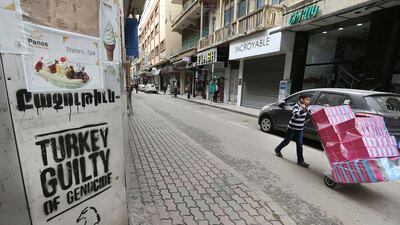BEIRUT // A century ago, Ottoman Turkish forces and their allies launched a campaign to wipe out Armenians from their empire.
In towns and villages across what is today Turkey, Armenians were rounded up and executed. Those not killed were deported, sent on death marches into Syria’s deserts or herded into concentration camps.
As Armenians this week mark 100 years since the massacres that killed more than one million people, the fear and persecution faced by their ancestors remains alive today. With Syria and Iraq in chaos, Armenians in the Middle East are once again homeless and on the run.
“We are having the same destiny as our grandfathers, as our ancestors, we are just like them,” said Annoush Garabadian, a 53-year-old Armenian woman who fled Mosul when ISIL captured the city last June. “We saw everything with our eyes like history was repeating itself.”
Vivid memories of persecution and survival from 1915 were passed down from generation to generation. Along with the killings, dehydration, hunger and disease claimed at least 1.5 million lives, according to Armenians.
Some were shot. Others had their throats slashed or were pushed into deep chasms to die. Town names were changed from Armenian to Turkish, and houses were torched.
Those who managed to escape death dispersed across the world, eventually setting up large diaspora communities in places like Beirut, Los Angeles and Paris.
Originally from Aleppo in Syria, Mrs Garabadian was brought to Iraq by marriage in 1980.
As Iraq went to war with Iran and later invaded Kuwait, her family had misgivings about staying in the country. But they decided to stay on, eventually weathering the US invasion of Iraq in 2003 and the insurgencies and civil war that soon followed.
They were used to surviving in a tumultuous Iraq, but when ISIL approached Mosul, they knew that staying would mean death.
In the middle of the night last June, Mrs Garabadian and her family bundled some belongings and escaped to Iraqi Kurdistan.
Not long after, neighbours sent them a picture showing their old house with ISIL’s logo painted on it. Their house and car now belonged to the so-called “caliphate”, and her son received a threatening phone call from ISIL militants saying if they ever returned, they would be beheaded.
“We were happy in Iraq before Daesh,” she said, referring to ISIL’s Arabic acronym. “They took everything.”
About 100,000 people of Armenian origin lived in Syria before the war, with the majority living in Aleppo.
Only about 13,000 Armenians live in Iraq according to the Armenian embassy in Baghdad.
The United Nations’ refugee agency, UNHCR, says 5,000 Syrian-Armenians are registered with them but Armenian organisations working with refugees put the number at about 10,000.
Additionally, about 15,000 Syrian-Armenians had fled to Armenia by the end of 2014 according to UNHCR and the Armenian government.
Many of the Armenians who left Syria for Lebanon have settled down in Burj Hammoud, an Armenian-majority Beirut suburb just east of the city.
Refugees fleeing the genocide a century ago established camps here on unwanted swampland. The refugees eventually became Lebanese citizens and rose from destitution to relative prosperity.
Today Burj Hammoud is a bustling market district of narrow alleys lined with shops, tiny restaurants and workshops.
Signs in Armenian mark businesses and the red, blue and orange flag of Armenia is everywhere.
Anti-Turkish graffiti — like “Turkey must die” spray-painted down one alley — can be seen on many walls here.
Burj Hammoud and many other Armenian enclaves in Lebanon might look like havens for the newest refugees fleeing conflicts in Syria and Iraq. But Armenian refugees say finding work is difficult and that they struggle to make ends meet.
Many have given up on returning to their homes in Syria or staying in the Middle East. Getting asylum in Europe or North America is a common goal here.
Restaurant owner George Sarkis, 33, is one of the many Armenian refugees seeking a better future in the west. Back in Aleppo, he had three restaurants that served Armenian cuisine, including one big enough to host large banquets. As the war dragged on, rebels captured his largest restaurant and business dried up at the remaining two.
“Of course nobody wants to leave their house, but when the military started to take place in our area, we couldn’t stay and watch so we decided to leave,” he said.
Since coming to Lebanon, Mr Sarkis has opened a restaurant serving Armenian and Aleppine specialities in Burj Hammoud. While business is good, he still hopes to emigrate to the west if he gets the chance. “They don’t see their futures in Syria anymore,” said Zaven Teghlian, refugee coordinator for the Howard Karagheusian Association, a non-governmental organisation assisting Syrian-Armenian refugees in Lebanon. “Lebanon has become a transit state for them.”
However, Catholicos Aram I, head of the Armenian Apostolic Church’s Holy See of Cilicia, is wary of Armenians leaving the region. “We’re part of the Middle East; we are not foreigners, we are not newcomers,” he said.
“We are deeply rooted in the history, in the civilisations, in the cultures of the Middle East. Therefore it is our firm position — of all the churches — that we must stay here.”
Reminders of the dangers to Armenians in the region are clearly visible on the grounds of the Armenian Apostolic cathedral he presides over in Antelias, a town north of Beirut.
In a quiet mausoleum, cracked human skulls recovered from the killing fields of Syria’s desert are piled up high.
foreign.desk@thenational.ae

